source(google.com.pk)
Funny Sms Of Pathan Biography
FUNNY
adj. fun·ni·er, fun·ni·est
1.
a. Causing laughter or amusement.
b. Intended or designed to amuse.
2. Strangely or suspiciously odd; curious.
3. Tricky or deceitful.
n. pl. fun·nies Informal
1. A joke; a witticism.
2. funnies
a. Comic strips.
b. The section of a newspaper containing comic strips.
Arousing or provoking laughter; "an amusing film with a steady stream of pranks and pratfalls"; "an amusing fellow"; "a comic hat"; "a comical look of surprise"; "funny stories that made everybody laugh"; "a very funny writer"; "it would have been laughable if it hadn't hurt so much"; "a mirthful experience"; "risible courtroom antics"
SMS
Short Message Service (SMS) is a text messaging service component of phone, web, or
Mobile communication systems, using standardized communications protocols that allow the exchange of short text messages between fixed line or mobile phone devices.
SMS is the most widely used data application in the world, with 3.6 billion active users, or 78% of all mobile phone subscribers. The term "SMS" is used as an acronym for all types of short text messaging and the user activity itself in many parts of the world. SMS is also employed in direct marketing, known as SMS marketing.
SMS as used on modern handsets originated from radio telegraphy in radio memo pagers using standardized phone protocols. These were defined in 1985 as part of the Global System for Mobile Communications (GSM) series of standards as a means of sending messages of up to 160 characters to and from GSM mobile handsets. Though most SMS messages are mobile-to-mobile text messages, support for the service has expanded to include such other mobile technologies as ANSI CDMA networks and Digital AMPS, as well as satellite and landline networks.
PATHAN
Pashtun people (Pashto: پښتانه Pax̌tānə; also spelled Pushtun, Pakhtun or Pukhtun), also known as ethnic Afghans (Persian: افغان) or Pathans (Urdu: پٹھان, Hindi: पठान Paṭhān), are an Iranic ethnic group belonging to Afghanistan and Pakistan. They are typically characterised by the usage of the Eastern Iranian Pashto language and practice of Pashtunwali, which is a traditional set of ethics guiding individual and communal conduct. Their origins are unclear but historians have come across references to various ancient peoples called Pakthas (Pactyans) between the 2nd and the 1st millennium BC, inhabiting the region between the Hindu Kush and Indus River, who may be the early ancestors of the Pashtun people. Since the 3rd century AD onward, they have been referred to by the ethnonym "Afghan".
Often characterised as a warrior and martial race, their history is spread amongst various countries of South, Central and Western Asia, centred around their traditional seat of power in medieval Afghanistan. During the Delhi Sultanate era, the Pashtun Lodi dynasty replaced the Turkic rulers in the northern part of the Indian subcontinent. Other Pashtuns fought the Safavids and the Mughals before obtaining an independent state in the early-18th century, which began with a successful revolution by Mir Wais Hotak followed by conquests of Ahmad Shah Durrani. Pashtuns played a vital role during the Great Game from the 19th century to the 20th century as they were caught between the imperialist designs of the British and Russian empires.
Pashtuns are the largest ethnic group in Afghanistan and reigned as the dominant ethno-linguistic group for about 300 years, with nearly all rulers being Pashtun. The mujahideen who fought against the pro-Soviet Afghan government in the 1980s were also dominated by Pashtun fighters. Abdul Ahad Mohmand became the first Afghan and 4th Muslim to journey into outer space, spending nine days aboard Mir space station in 1988. Zalmay Khalizad became the first Muslim and first Afghan to become Ambassador of the United States. Many famous Bollywood superstars in India are of Pashtun descent. Some became high ranking officials working for the World Bank, the United Nations and other international organizations.
They made up the majority of the Taliban and the current Afghan government. They are also an important community in Pakistan, which has the largest Pashtun population and constitute the second-largest ethnic group, having attained presidency there and high rankings in sports. They are the world's largest (patriarchal) segmentary lineage ethnic group. According to Ethnologue, the total population of the group is estimated to be around 50 million but an accurate count remains elusive due to the lack of an official census in Afghanistan since 1979. Estimates of the number of Pashtun tribes and clans range from about 350 to over 400.
Pashtun culture is mostly based on Pashtunwali and the usage of the Pashto language. Pre-Islamic traditions, dating back to Alexander's defeat of the Persian Empire in 330 BC, possibly survived in the form of traditional dances, while literary styles and music reflect influence from the Persian tradition and regional musical instruments fused with localised variants and interpretation. Pashtun culture is a unique blend of native customs with some influences from South and Western Asia. Like other Muslims, Pashtuns celebrate Ramadan and Eid al-Fitr. Some also celebrate Nouruz, which is the Persian new year dating to pre-Islamic period.
The majority of Pashtuns use Pashto as their native tongue, believed to belong to the Indo-Iranian language family, and is spoken by up to 60 million people. It is written in the Pashto-Arabic script and is divided into two main dialects, the southern "Pashto" and the northern "Pukhto". The language has ancient origins and bears similarities to extinct languages such as Avestan and Bactrian. Its closest modern relatives may include Pamir languages, such as Shughni and Wakhi, and Ossetic.[citation needed] Pashto may have ancient legacy of borrowing vocabulary from neighbouring languages including such as Persian and Vedic Sanskrit. Modern borrowings come primarily from the English language.
Fluency in Pashto is often the main determinant of group acceptance as to who is considered a Pashtun. Pashtun nationalism emerged following the rise of Pashto poetry that linked language and ethnic identity. Pashto has national status in Afghanistan and regional status in neighboring Pakistan. In addition to their native tongue, many Pashtuns are fluent in Urdu, Dari (Persian), and English. Throughout their history, poets, prophets, kings and warriors have been among the most revered members of Pashtun society. Early written records of Pashto began to appear around the 16th century.
The earliest describes Sheikh Mali's conquest of Swat. Pir Roshan is believed to have written a number of Pashto books while fighting with the Mughals. Pashtun scholars such as Abdul Hai Habibi and others believe that the earliest Pashto work dates back to Amir Kror Suri, and they use the writings found in Pata Khazana as proof. Amir Kror Suri, son of Amir Polad Suri, was an 8th century folk hero and king from the Ghor region in Afghanistan. However, this is disputed by several European experts due to lack of strong evidence.
The advent of poetry helped transition Pashto to the modern period. Pashto literature gained significant prominence in the 20th century, with poetry by Ameer Hamza Shinwari who developed Pashto Ghazals. In 1919, during the expanding of mass media, Mahmud Tarzi published Seraj-al-Akhbar, which became the first Pashto newspaper in Afghanistan. In 1977, Khan Roshan Khan wrote Tawarikh-e-Hafiz Rehmatkhani which contains the family trees and Pashtun tribal names. Some notable poets include Khushal Khan Khattak, Afzal Khan Khattak, Ajmal Khattak, Pareshan Khattak, Rahman Baba, Nazo Anaa, Ahmad Shah Durrani, Timur Shah Durrani, Shuja Shah Durrani, Ghulam Muhammad Tarzi, and Ghani Khan.
Recently, Pashto literature has received increased patronage, but many Pashtuns continue to rely on oral tradition due to relatively low literacy rates and education. Pashtun males continue to meet at Hujras, to listen and relate various oral tales of valor and history. Despite the general male dominance of Pashto oral story-telling, Pashtun society is also marked by some matriarchal tendencies. Folktales involving reverence for Pashtun mothers and matriarchs are common and are passed down from parent to child, as is most Pashtun heritage, through a rich oral tradition that has survived the ravages of time.
[1 Pathan Cinema mai Film dekh raha tha.
Film mai 1 Shair dowarty howe araha tha.
Pathan ne dekha tu dar gia, owr apni chadir kandhy pa dal kar bhaagny laga
Logo ne kaha: Khan Sahib mat daro, yai tu film hai
Pathan: Wo tu mujh ko bhi pata hai ke yai film hai, lekin wo tu janwar hai, usko kia pata
1 Pathan Namaz parh raha tha
To dosra usky bare mai kesi ko bata raha tha ke yai boht Namazi owr naik banda hai.
Pathan Namaz thor kar bola:
Es ko bolo ke "hum ne Haj bhi kia hai"
Pathan: Aaj mai bus ke peche bhagty howe ghar tak aya hon, owr karaye ke 20 rupey bhi bacha leye.
2nd Pathan: Tum boht bewakof ho, Rekshe ke peche bhagty tu 80 rupey bach jaty
Teacher: Es mohawary ko estimal karo "mun mai pani aana"
Pathan Student: Jaisy hi mai ne Nal ko mun laga ke Nal chalu kia, tu mairy mun mai pani agia
Ques: Agar dunia mai bejli nahi hoti tu TV kesay daikhty?
Pathan: Mom-batti jala ke !
Pathan: Raat ko 1 admi ne Chaku dekha kar loot lia
Dost: Lekin tumhare pas tu hamaisha PISTOL hoti hai na
Pathan: Wo mai ne chupa di warna wo bhi le jata
Pathan 2 Shopkeeper: 1 Kala bulb daina !
Shopkeeper: Kaalay buld ka kia karna hai?
Pathan: Dopehr mai sonay ke lie andhair karna hai
Qatil: Try karo ke umar qaid ho jaye maga saza-e-mot na hojay
Pathan Lawyer: Tum fikar mat karo
After Case
Qatil: Kya howa?
Pathan: Boht mushkil se umar qaid howi, warna adalat tu reha kar rahi thi
Pathan 2 shopkeeper: Bhai sahb 1 rupia ka Easy Load kardo
Shopkeeper: 1 rupey ke load se kesi ko call karni hai ya msg?
Pathan: Karna tu kuch bhi nahi,
Bus aisy hi paisy urany ki adat hai
Teacher to Pathan: Tum ne home-work kion nahi kia?
Pathan: Sir hum hostel mai rehta hai]
Funny Sms Of Pathan Biography
FUNNY
adj. fun·ni·er, fun·ni·est
1.
a. Causing laughter or amusement.
b. Intended or designed to amuse.
2. Strangely or suspiciously odd; curious.
3. Tricky or deceitful.
n. pl. fun·nies Informal
1. A joke; a witticism.
2. funnies
a. Comic strips.
b. The section of a newspaper containing comic strips.
Arousing or provoking laughter; "an amusing film with a steady stream of pranks and pratfalls"; "an amusing fellow"; "a comic hat"; "a comical look of surprise"; "funny stories that made everybody laugh"; "a very funny writer"; "it would have been laughable if it hadn't hurt so much"; "a mirthful experience"; "risible courtroom antics"
SMS
Short Message Service (SMS) is a text messaging service component of phone, web, or
Mobile communication systems, using standardized communications protocols that allow the exchange of short text messages between fixed line or mobile phone devices.
SMS is the most widely used data application in the world, with 3.6 billion active users, or 78% of all mobile phone subscribers. The term "SMS" is used as an acronym for all types of short text messaging and the user activity itself in many parts of the world. SMS is also employed in direct marketing, known as SMS marketing.
SMS as used on modern handsets originated from radio telegraphy in radio memo pagers using standardized phone protocols. These were defined in 1985 as part of the Global System for Mobile Communications (GSM) series of standards as a means of sending messages of up to 160 characters to and from GSM mobile handsets. Though most SMS messages are mobile-to-mobile text messages, support for the service has expanded to include such other mobile technologies as ANSI CDMA networks and Digital AMPS, as well as satellite and landline networks.
PATHAN
Pashtun people (Pashto: پښتانه Pax̌tānə; also spelled Pushtun, Pakhtun or Pukhtun), also known as ethnic Afghans (Persian: افغان) or Pathans (Urdu: پٹھان, Hindi: पठान Paṭhān), are an Iranic ethnic group belonging to Afghanistan and Pakistan. They are typically characterised by the usage of the Eastern Iranian Pashto language and practice of Pashtunwali, which is a traditional set of ethics guiding individual and communal conduct. Their origins are unclear but historians have come across references to various ancient peoples called Pakthas (Pactyans) between the 2nd and the 1st millennium BC, inhabiting the region between the Hindu Kush and Indus River, who may be the early ancestors of the Pashtun people. Since the 3rd century AD onward, they have been referred to by the ethnonym "Afghan".
Often characterised as a warrior and martial race, their history is spread amongst various countries of South, Central and Western Asia, centred around their traditional seat of power in medieval Afghanistan. During the Delhi Sultanate era, the Pashtun Lodi dynasty replaced the Turkic rulers in the northern part of the Indian subcontinent. Other Pashtuns fought the Safavids and the Mughals before obtaining an independent state in the early-18th century, which began with a successful revolution by Mir Wais Hotak followed by conquests of Ahmad Shah Durrani. Pashtuns played a vital role during the Great Game from the 19th century to the 20th century as they were caught between the imperialist designs of the British and Russian empires.
Pashtuns are the largest ethnic group in Afghanistan and reigned as the dominant ethno-linguistic group for about 300 years, with nearly all rulers being Pashtun. The mujahideen who fought against the pro-Soviet Afghan government in the 1980s were also dominated by Pashtun fighters. Abdul Ahad Mohmand became the first Afghan and 4th Muslim to journey into outer space, spending nine days aboard Mir space station in 1988. Zalmay Khalizad became the first Muslim and first Afghan to become Ambassador of the United States. Many famous Bollywood superstars in India are of Pashtun descent. Some became high ranking officials working for the World Bank, the United Nations and other international organizations.
They made up the majority of the Taliban and the current Afghan government. They are also an important community in Pakistan, which has the largest Pashtun population and constitute the second-largest ethnic group, having attained presidency there and high rankings in sports. They are the world's largest (patriarchal) segmentary lineage ethnic group. According to Ethnologue, the total population of the group is estimated to be around 50 million but an accurate count remains elusive due to the lack of an official census in Afghanistan since 1979. Estimates of the number of Pashtun tribes and clans range from about 350 to over 400.
Pashtun culture is mostly based on Pashtunwali and the usage of the Pashto language. Pre-Islamic traditions, dating back to Alexander's defeat of the Persian Empire in 330 BC, possibly survived in the form of traditional dances, while literary styles and music reflect influence from the Persian tradition and regional musical instruments fused with localised variants and interpretation. Pashtun culture is a unique blend of native customs with some influences from South and Western Asia. Like other Muslims, Pashtuns celebrate Ramadan and Eid al-Fitr. Some also celebrate Nouruz, which is the Persian new year dating to pre-Islamic period.
The majority of Pashtuns use Pashto as their native tongue, believed to belong to the Indo-Iranian language family, and is spoken by up to 60 million people. It is written in the Pashto-Arabic script and is divided into two main dialects, the southern "Pashto" and the northern "Pukhto". The language has ancient origins and bears similarities to extinct languages such as Avestan and Bactrian. Its closest modern relatives may include Pamir languages, such as Shughni and Wakhi, and Ossetic.[citation needed] Pashto may have ancient legacy of borrowing vocabulary from neighbouring languages including such as Persian and Vedic Sanskrit. Modern borrowings come primarily from the English language.
Fluency in Pashto is often the main determinant of group acceptance as to who is considered a Pashtun. Pashtun nationalism emerged following the rise of Pashto poetry that linked language and ethnic identity. Pashto has national status in Afghanistan and regional status in neighboring Pakistan. In addition to their native tongue, many Pashtuns are fluent in Urdu, Dari (Persian), and English. Throughout their history, poets, prophets, kings and warriors have been among the most revered members of Pashtun society. Early written records of Pashto began to appear around the 16th century.
The earliest describes Sheikh Mali's conquest of Swat. Pir Roshan is believed to have written a number of Pashto books while fighting with the Mughals. Pashtun scholars such as Abdul Hai Habibi and others believe that the earliest Pashto work dates back to Amir Kror Suri, and they use the writings found in Pata Khazana as proof. Amir Kror Suri, son of Amir Polad Suri, was an 8th century folk hero and king from the Ghor region in Afghanistan. However, this is disputed by several European experts due to lack of strong evidence.
The advent of poetry helped transition Pashto to the modern period. Pashto literature gained significant prominence in the 20th century, with poetry by Ameer Hamza Shinwari who developed Pashto Ghazals. In 1919, during the expanding of mass media, Mahmud Tarzi published Seraj-al-Akhbar, which became the first Pashto newspaper in Afghanistan. In 1977, Khan Roshan Khan wrote Tawarikh-e-Hafiz Rehmatkhani which contains the family trees and Pashtun tribal names. Some notable poets include Khushal Khan Khattak, Afzal Khan Khattak, Ajmal Khattak, Pareshan Khattak, Rahman Baba, Nazo Anaa, Ahmad Shah Durrani, Timur Shah Durrani, Shuja Shah Durrani, Ghulam Muhammad Tarzi, and Ghani Khan.
Recently, Pashto literature has received increased patronage, but many Pashtuns continue to rely on oral tradition due to relatively low literacy rates and education. Pashtun males continue to meet at Hujras, to listen and relate various oral tales of valor and history. Despite the general male dominance of Pashto oral story-telling, Pashtun society is also marked by some matriarchal tendencies. Folktales involving reverence for Pashtun mothers and matriarchs are common and are passed down from parent to child, as is most Pashtun heritage, through a rich oral tradition that has survived the ravages of time.
[1 Pathan Cinema mai Film dekh raha tha.
Film mai 1 Shair dowarty howe araha tha.
Pathan ne dekha tu dar gia, owr apni chadir kandhy pa dal kar bhaagny laga
Logo ne kaha: Khan Sahib mat daro, yai tu film hai
Pathan: Wo tu mujh ko bhi pata hai ke yai film hai, lekin wo tu janwar hai, usko kia pata
1 Pathan Namaz parh raha tha
To dosra usky bare mai kesi ko bata raha tha ke yai boht Namazi owr naik banda hai.
Pathan Namaz thor kar bola:
Es ko bolo ke "hum ne Haj bhi kia hai"
Pathan: Aaj mai bus ke peche bhagty howe ghar tak aya hon, owr karaye ke 20 rupey bhi bacha leye.
2nd Pathan: Tum boht bewakof ho, Rekshe ke peche bhagty tu 80 rupey bach jaty
Teacher: Es mohawary ko estimal karo "mun mai pani aana"
Pathan Student: Jaisy hi mai ne Nal ko mun laga ke Nal chalu kia, tu mairy mun mai pani agia
Ques: Agar dunia mai bejli nahi hoti tu TV kesay daikhty?
Pathan: Mom-batti jala ke !
Pathan: Raat ko 1 admi ne Chaku dekha kar loot lia
Dost: Lekin tumhare pas tu hamaisha PISTOL hoti hai na
Pathan: Wo mai ne chupa di warna wo bhi le jata
Pathan 2 Shopkeeper: 1 Kala bulb daina !
Shopkeeper: Kaalay buld ka kia karna hai?
Pathan: Dopehr mai sonay ke lie andhair karna hai
Qatil: Try karo ke umar qaid ho jaye maga saza-e-mot na hojay
Pathan Lawyer: Tum fikar mat karo
After Case
Qatil: Kya howa?
Pathan: Boht mushkil se umar qaid howi, warna adalat tu reha kar rahi thi
Pathan 2 shopkeeper: Bhai sahb 1 rupia ka Easy Load kardo
Shopkeeper: 1 rupey ke load se kesi ko call karni hai ya msg?
Pathan: Karna tu kuch bhi nahi,
Bus aisy hi paisy urany ki adat hai
Teacher to Pathan: Tum ne home-work kion nahi kia?
Pathan: Sir hum hostel mai rehta hai]
Funny Sms Of Pathan
Funny Sms Of Pathan
Funny Sms Of Pathan
Funny Sms Of Pathan
Funny Sms Of Pathan
Funny Sms Of Pathan
Funny Sms Of Pathan
Funny Sms Of Pathan
Funny Sms Of Pathan
Funny Sms Of Pathan
Funny Sms Of Pathan
Funny Sms Of Pathan
Funny Sms Of Pathan
Funny Sms Of Pathan
Funny Sms Of Pathan


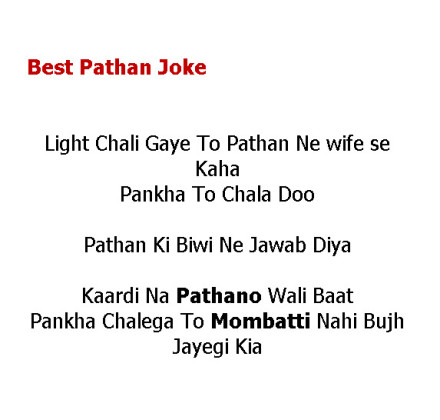
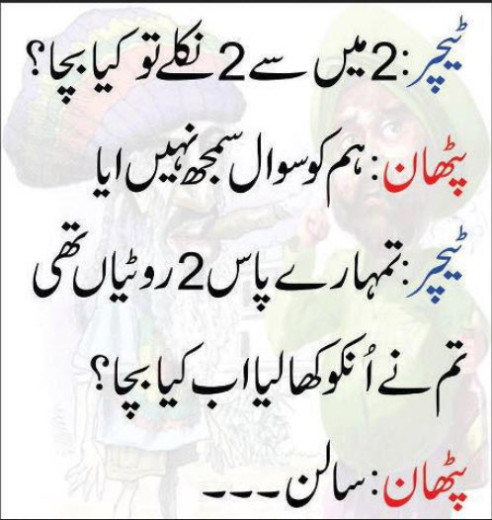
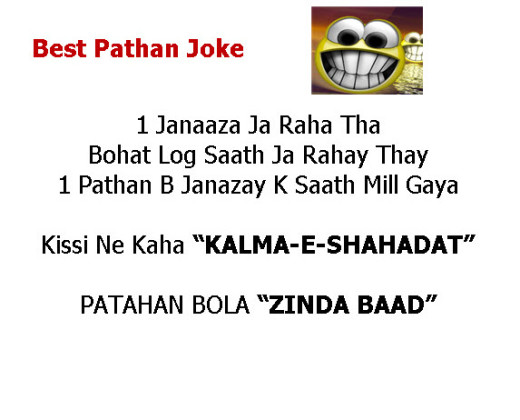
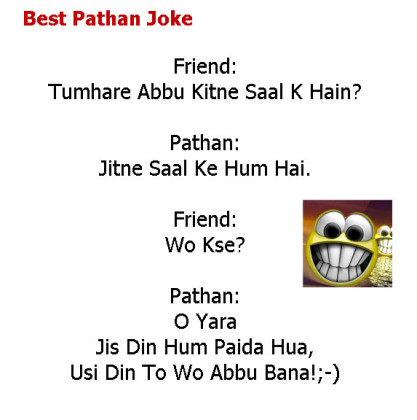
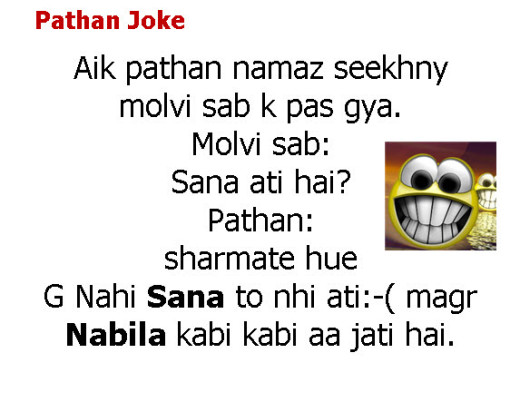






No comments:
Post a Comment